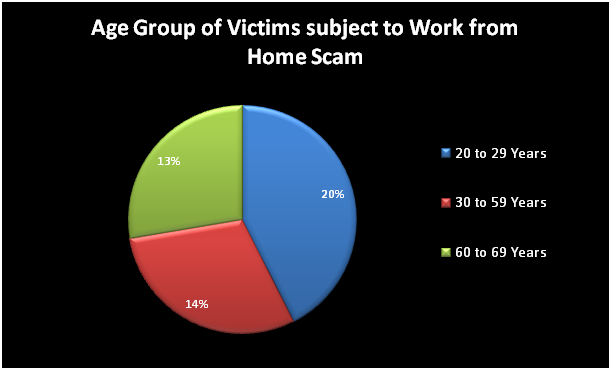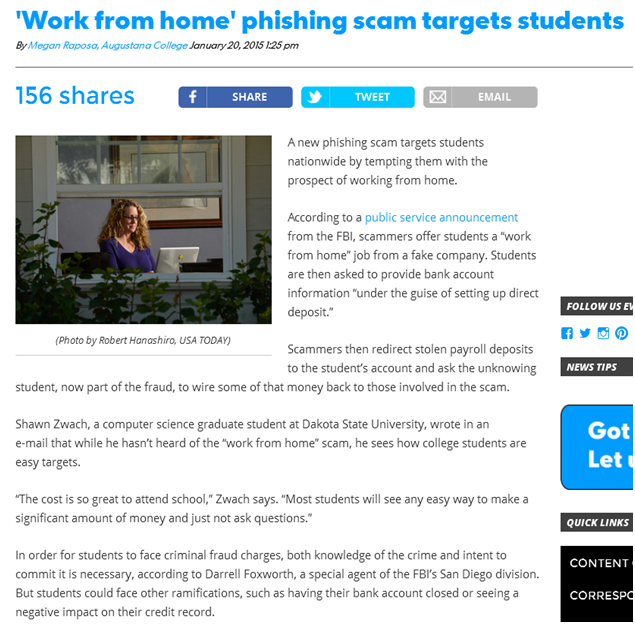Work from Home Scam
Work-at-home scams have always been around. They offer you a supposedly easy way to make lots of money in just a little time from the privacy of your own home, but they rarely ever turn out to be what they claim to be. The Internet is no stranger to the proliferation of scams, with employment schemes ranking #6 according to the Consumer Protection Agency. You need to be a smart consumer, particularly when it comes to work-at- home offerings. If anything says you must pay for information or supplies to get started. We have explored a new set of data regarding emerging
internet work from home scams and a set of websites that strive hard to attain scam-free economy.
An employment opportunity to work from your own home earning a great wage which may be no more than stuffing envelopes, but to get the material to stuff the envelopes you have to send money away, often to nothing more than a PO Box address. In return you receive the information that you have to photocopy at your own expense and then stuff the envelopes. Recently reported work from home schemes offers you the opportunity to earn thousands processing emails. Work from home schemes may be promoted through newspaper advertisements, direct mail drops or through
unsolicited emails asking you to visit a website for more information.
Other work from home type schemes require you to make gift items from home or grow flowers for the export market, but then require you to also sell these products yourself. One characteristic common to these schemes is that you are required to invest or send away money before you can start work. As good as the "wages" sound, the promoters often don't give the full story. The schemes are often no more than phony get rich quick schemes - where you're not the one getting rich!
How to check it out
1. Ask for a street address, not just a PO Box, and find out as much as you can about the company and its operations.
2. Ask to talk to other employees - and to ensure they are for real, visit them to see what type of work is involved and how they are organized.
3. Ask to see examples of the final product and the work required.
4. Ask what materials are supplied, or not supplied.
5. Ask how you will be paid - and in what currency.
6. Research the product - is it a viable money-maker, and are the proposed returns achievable?
7. Do your sums - ask yourself whether the time required doing the job, in conjunction with the start up or material costs, match the returns to be expected.
Types of Work from Home Scam:
1) Bait and Switch Schemes
Bait and switch scam schemes are those where the scammers send out prospective work from home schemes where the victims are supposed to pay the initial cost of materials, and perform the stated task. The wage or salary is promised after the complete package of work is done. Once the work is done there is no trace of the job providers, and the scammers manage to make profit at the expense of someone unknown who would have fallen prey to "work from home" scam.
2) Check forwarding schemes
In this type of scam, the victims receive a check from the scammer for completing a work. The scammer purposely adds a higher amount on the check and the victim is asked to wire the balance amount to the scammer's account. The check that is received proves to be a counterfeit and the victim becomes responsible for check fraud charges. Most of these check forwarding scams happen in cases of merchandise goods purchased from stolen credit cards. The victim thinks that they are earning money by working from home, but in the end they land up in trouble which is nothing but scam.
3) Craft Assembling
Crafts Assembling, a scheme adopted by scammers where in the victim (who is willing to work from home) is asked to assemble crafts like toys, machinery parts, and other similar goods with the aim of selling them at a higher price. Once the victim purchases and assembles these crafts, the scammer disapproves the quality or makes reasons with the assembled craft. In the end, the scammer becomes successful in selling the crafts and making money, and the victim is left with nothing but the assembled crafts.
4) Email Processing
Email Processing is a profile given by scammers for work from home jobs. They promise you to pay $25 for each email that you process. Email processing according to them is spamming the email in web forums and newsgroups. No legitimate company gives money for spamming. Once their work is done, there is no response from the scammer's side.
5) Envelope Stuffing
Envelope stuffing is the most common type of work from home scam. This scam has been around since 1920s and 1930s. But in the recent past, this scam has spread viral on the internet. In such type of scam, the employee is asked to stuff envelopes and pay an advance fee. Every week the victim is given 1,000 envelopes with postage and address already affixed. All the employee has to do is stuff them. The scammer scams the victim in the name of advance payment which is never returned to the user.
6) Forum Spamming
Forum Spamming is another work from home scam that is similar to email processing. In this type of scam, the worker is given instructions to spam online forums with advertisements or junk links. The worker is asked to make forum posts and comments and is promised that they will earn from this type of online marketing. Youngsters who are unaware of such malpractices fall prey to such types of work from home jobs and end up earning nothing.
7) Internet Businesses
Internet Businesses is the new work from home scam. Scammers run presentations to convince you that you can start an online internet business of your own. They even guarantee to provide excellent coaching from experienced business personnel's. You are asked to pay a small amount as an initial investment and once you do that, they pressurize you to pay even more. There will be no sign of your internet business once the scammers have pulled off enough money from your pocket.
8) Mentoring Programs
Another smart way in which scammers get away with your money in the name of work from home job is "mentoring programs". Scammers give attractive advertisements in media such as newspapers and magazines offering a $59 startup kit that can be used to conduct mentoring programs. The users get carried away for this earn by mentoring opportunity. But once they buy this kit, the scammer sends them a note to pay more money so that a coach can train them for the mentoring program. The amount asked by the scammer is higher than the previous fee. People who register for such programs are fooled by scammers in the name of work from home opportunities.
9) Multi-Level Marketing
Multi level marketing is similar to the pyramid scheme where the scammer becomes more interested in getting people recruited rather than selling the product. There are many legitimate multi level marketing companies that operate with the aim of making profit and in turn benefitting the seller working from home. But this concept is taken advantage of by scammers and they run bogus MLM (multi level marketing) companies to conduct fraud.
10) Mystery Shopping
Mystery shopping companies operate with the aim of exchanging information about their product for money. Some fraud mystery shopping companies hire people who want to work from home, for collecting such information. In the process of money transaction that is involved, the scammers get the worker's personal financial information and manage to abduct funds from their account.
11) Pharmacy Billing
In this type of scam, a decent scammer approaches you to start your own medical billing system from home. They promise to bring you the medical billing software, potential clients and every other thing that is necessary for a successful business. In return you are asked to pay an initial set up fee. Once you deposit the amount, the scammer comes up with a list of reasons saying why the software is not functioning as per requirement and why the potential clients have suddenly disappeared. There is no way left for the work from home investor to get back his initial investment.
12) Rebate Processing
In rebate processing scam, the workers are made to come across an ad that says you can earn money by processing rebates. They convince you that the amount that you pay for training, certification etc is much lesser than what you will earn. Once the fee is deposited, there are no rebates to process and the material that you have paid for has no value.
13) Internet Search Engine scams
These types of work from home jobs tell you that you can make money by doing searches on prominent search engines and filling up few forms. In return they ask you to pay a small shipping fee that is considerably less than what you will earn. And every time a new worker accesses his/her debit or credit card for paying the small shipping fee; they use all their personal financial information and put additional charges on the card.
14) Typing from Home
In typing from home scam, scammers send spam advertisements to the workers to be typed and loaded on disks. The prices of these disks are to be borne by the workers themselves. In the name of typing from home, the scammer also make the workers sell these typed disks. In reality there are going to be no buyers for such spam advertisement disks.
15) Using your Computer from Home Scam
This type of scam is very less frequent in the list of work from home scams. The ultimate aim of the scammer is to use the resources of the worker to get his work done. The scammer pays a very negligible amount in return for getting his work done or sometimes doesn't pay at all, finding faults even with the job that is done correctly.
Most common ways in which scammers find users for Work from Home Fraud
» Email from a Job Board or directly from the employer
» Posting Fake jobs on social media
» Fake job posting by legitimate employers
» Scam job offers on legitimate job portals
» Fake websites offering "work from home" scheme.
Methodologies used by Scammers attract people for Work from Home:
1) "A List of Companies looking for Home Workers!" Scheme
The entire list is filled with scammers who are involved in work from home scam. They decide to work jointly in targeting victims and agree to share the profits equally. These groups of scammers do this with the intention that a group may look legitimate to the users than a single work from home scheme. Every company that you choose in the list will have a small registration fee that is required to be paid by all those willing to work from home in their company. The ultimate aim of these scammers in to collect small fee from large number of people.
2) "Just Call This 1-900 Number For More Information�" Scheme
The entire list is filled with scammers who are involved in work from home scam. They decide to work jointly in targeting victims and agree to share the profits equally. These groups of scammers do this with the intention that a group may look legitimate to the users than a single work from home scheme. Every company that you choose in the list will have a small registration fee that is required to be paid by all those willing to work from home in their company. The ultimate aim of these scammers in to collect small fee from large number of people.
Statistics on Work from Home Scam
A total of 2600 respondents were interviewed asking if they had ever been subject to work from home scam. The results of the survey revealed that 47% of the recipients were subject to work from home scam, whereas 53% of the group had never personally come across work from home scams. The chart below depicts a graphical representation of percentage of victims subject to work from home scam.

A further research on the age group of the victims subject to work from home scam revealed that, youngsters falling in the age group of 20 to 29 years are the most likely to fall prey for such scams. It was observed that a total of 47% of the respondents were victims of work from home scam, of which 20% were of age group 20 to 29 years. The least were of age group 60 to 69 years, falling in 13% slot. The rest 14% were of age group 30 to 59 years. We infer from this that, there is a huge problem within the millennial generation who is looking for work, which is why they are more likely to give out personal information to scammers in hopes for employment.

10 Examples of Work from Home Scams :
1) Scammers give attractive offers to lure victims

2) Sympathetic tag lines that appear Legitimate.

3) Variety of options on Work from home schemes

4) Social Media targeted for Work from Home Scam

5) Example of Envelope Stuffing work from home scam

6) Work from Home Scam - Nigeria

7) Internet Business Work from Home Scam

8) Students target for Work from Home Scam

9) Example of Work from Home Scam Email

10) Starting your own Business from Home Scam

Real Time Examples of Job Scam :
Dear Mr Rozario,
Warm Greetings and Congratulations!
We take great pleasure in inviting you to be an integral part of Agarwal Hospitality Ltd.
This has reference to your application and subsequent discussions held regarding a placement in our organization. We are pleased to confirm that we would like to offer you a position of _ to be Agarwal Hospitality Ltd.
The details of the offer terms and conditions are provided in the attached file. This offer stands valid subject to your medical fitness and verification of your certificates and testimonials (ie: certificates in proof of educational qualifications, proof of past employments and satisfactory reference checks).
The company may also, if found necessary, conduct background verification in specific instances even after your joining Agarwal Hospitality Ltd.
Please note that this has to be done prior to your joining with us.
You can make arrangements to send the scanned copy of the fitness certificate thru mail immediately after the receipt.
The company will be able to reimburse up to 100USD/- (on your joining subject to the submission of original bills) towards the above expenses borne by you.
You have to bring original Documents at the time of joining the company along with this mail, (mandatory) to be submitted on your date of joining.
As discussed and mutually agreed we look forward to have you on the board on or before 20th, May 2016.
Pdf :


Feel Free to use our Spam Checker Tool
We are providing the
Spam
Checker Tool for your convenience. Here you can enter the
email or the contact number that you suspect to be a scam. This
tool checks it with our spam database list and ensure you regarding
the email or the phone number is real one or the bogus.
Report scam to United States government-you could file a
complaint
about scam or other crime here.
Related Scams:
Payment Scams
The Payment Scam or Advance Payment Scam is the most common form of fraud encountered in on-line sales of goods but has also beenRead More...
PayPal Scams
Millions of people all over the world use mobile-friendly digital wallets for receiving and transferring funds. Read More...
Pension Scams
Pension scams such as 'pension loans' or upfront cash offers are being used to swindle savers out of their moneyRead More...
Perfume Scams The users are generally asked to sniff a bottle of perfume or sniff a perfume paper strip that contains no neat perfume. Once the..Read More...
Pharmacy Scams
Pharmacy scam operations websites appear to be out of compliance with state and federal laws; sometimes they imitate themselves to be Read More...

















